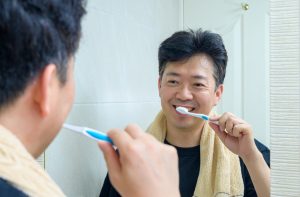Painless Surgical and Simple Tooth Removal
We understand that many patients harbor apprehensions about tooth extractions due to concerns about pain. Rest assured, we go to great lengths to guarantee your comfort. Dr. Andrew Howard specializes in performing tooth extractions that are not only safe but virtually painless. Our commitment is to swiftly restore your oral health in just one visit to our dental office in Loveland, CO.
Types of Tooth Extraction
Simple Extraction
Simple extractions involve the removal of fully emerged teeth. They are visible above the gum line, and the procedure typically has a relatively quick healing time, usually within 48 to 72 hours.
Surgical Extraction
Surgical extractions are more complex and are reserved for teeth that have partially emerged or haven’t yet breached the gums. The healing time is longer, typically exceeding 72 hours. These extractions are typically performed under dental sedation and local anesthesia. Dr. Howard will provide detailed instructions including a healing timeline during your initial consultation.
Wisdom Teeth Extraction
 Wisdom teeth extraction is often necessary when the third set of molars becomes impacted. Impacted wisdom teeth are vulnerable to decay, recurring infections, and gum disease. Young adults are strongly advised to opt for wisdom tooth extraction to prevent future issues like impacted wisdom teeth and ensure optimal healing.
Wisdom teeth extraction is often necessary when the third set of molars becomes impacted. Impacted wisdom teeth are vulnerable to decay, recurring infections, and gum disease. Young adults are strongly advised to opt for wisdom tooth extraction to prevent future issues like impacted wisdom teeth and ensure optimal healing.
When Are Tooth Extractions Necessary?
Tooth extractions become necessary in various circumstances to preserve oral health. Some common situations include:
- Advanced Gum Disease: Periodontal disease can result in tooth deterioration and loss, often necessitating extraction.
- Decayed or Damaged Teeth: When damage or decay reaches the tooth’s root, extraction may be the only recourse to prevent infection.
- Impacted Wisdom Teeth: Wisdom teeth can cause discomfort or pain if they fail to emerge properly from the gums, making extraction a preventive measure against infection and discomfort.
- Overcrowded Teeth: Teeth overcrowding can lead to alignment issues, and tooth extraction can help rectify alignment problems.
Benefits of Tooth Extractions
Some benefits of promptly removing infected or impacted teeth include:
- Pain Relief: Tooth extractions can relieve the pain and discomfort caused by severely damaged or impacted teeth.
- Infection Prevention: Extraction can prevent infection from a decaying or damaged tooth to neighboring teeth.
- Improved Oral Health: Removing problematic teeth can contribute to better overall oral health, preventing further complications.
Tooth Extraction Aftercare
 To ensure proper healing and minimize complications with the blood clot, follow these aftercare guidelines:
To ensure proper healing and minimize complications with the blood clot, follow these aftercare guidelines:
- Avoid Heavy Lifting and Vigorous Exercise: Refrain from heavy lifting and strenuous physical activity for the first 24 hours.
- Take Prescribed Pain Medications: Follow your dentist’s instructions for pain medication use.
- Avoid Smoking, Alcohol, and Straws: To prevent dislodging the blood clot, stay away from smoking, alcohol, and straw usage for at least 72 hours.
- Gentle Oral Hygiene: Avoid brushing and flossing near the extraction site.
- Swelling Reduction: Apply a cold compress to the cheek to reduce swelling.
- Bleeding Control: Bite on a gauze pad to control bleeding, replacing it every 30 minutes or as needed.
You should be able to resume your daily activities after several days following your procedure. If bleeding, severe pain, or swelling persists after three days, contact our Loveland, CO, office at (970) 669-3918.
Financing Tooth Extraction
Before any tooth extraction procedure, we believe in providing full transparency regarding the associated costs. You will receive a detailed discussion of the expenses involved and a breakdown of available payment options. This way, you can make an informed choice that suits both your requirements and your budget.
Our practice accepts a variety of payment methods to ensure that financing your tooth extraction is as seamless as possible:
- Major Credit Cards: We accept most major credit cards for your convenience.
- Insurance Plans: We work closely with numerous insurance providers to maximize your coverage benefits.
- Interest-Free Payment Plans: For added flexibility, we offer interest-free payment plans, making the financial aspect of your tooth extraction more manageable.
Our dedicated office staff is always available to assist you with insurance claims and paperwork, and we’ll collaborate with your insurance provider to help you obtain the maximum benefits from your coverage. If you have any questions about your insurance or financing, please don’t hesitate to get in touch with us.
Frequently Asked Questions
Recovery time can vary depending on the type of extraction. Simple extractions typically heal within 48 to 72 hours, while surgical extractions may take longer. Wisdom teeth extractions can require a few days to a week for recovery.
Getting a tooth pulled isn’t painful at all! Thanks to modern techniques and anesthesia, tooth extractions are relatively painless, with minimal discomfort during the procedure. Afterward, you may experience some soreness or mild dental pain, which can be managed with prescribed pain medications.
After wisdom tooth extraction, it’s important not to engage in heavy lifting or vigorous exercise, avoid smoking, alcohol, and using straws for at least 72 hours, and refrain from brushing and flossing near the extraction site to prevent complications.
Eat soft foods and liquids immediately after a tooth extraction. This includes yogurt, applesauce, soup, mashed potatoes, and smoothies. Gradually reintroduce solid foods as your healing progresses, following your dentist or oral surgeon’s advice.
Affordable Tooth Extraction Surgery with Dr. Howard
In some cases, removing a tooth is essential for oral health, and ignoring painful symptoms may lead to nasty infections. Dr. Howard will work with you to ensure your experience is as painless and stress-free as possible.
To schedule an appointment, contact our Loveland dental office at (970) 669-3918. You can also fill out an online contact form, and a team member will get back to you shortly. We look forward to helping other teeth and your oral health back on track! We welcome patients from Boulder, Fort Collins, and Evans.

